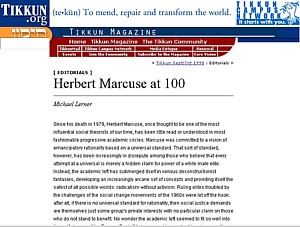Herbert Marcuse at 100
by Michael Lerner
Since his death in 1979, Herbert
Marcuse, once thought to be one of the most influential social theorists
of our time, has been little read or understood in most fashionable progressive
academic circles. Marcuse was committed to a vision of emancipatory rationality
based on a universal standard. That sort of standard, however, has been
increasingly in disrepute among those who believe that every attempt at
a universal is merely a hidden claim for power of a white male elite.
Instead, the academic left has submerged itself in various deconstructionist
fantasies, developing an increasingly arcane set of concepts and providing
itself the safest of all possible worlds: radicalism without activism.
Ruling elites troubled by the challenges of the social change movements
of the 1960s were let off the hook: after all, if there is no universal
standard for rationality, then social justice demands are themselves just
some group's private interests with no particular claim on those who do
not stand to benefit. No wonder the academic left seemed to fit so well
into the selfishness of the Reagan/Bush/Clinton years. No wonder it has
been so ill-prepared to fight assaults on affirmative action and, if University
of California Regent Connerly has his way (as he did when he engineered
the ballot measure dismantling affirmative action in California) attempts
to eliminate ethnic studies in the university.
Given this, it is refreshing to read Herbert Marcuse on the occasion of the 100th anniversary of his birth and the issuing of a series of previously unpublished writings and letters by the progressive publisher Routledge under the guidance of University of Texas philosophy professor Douglas Kellner. In the recently released first volume of the series, a compilation of writings from the 1940s, we get reminded of Marcuse's incredible intellectual power. Marcuse's critique of technology as a system of domination, while rejecting the knee-jerk anti-scientism that would later characterize some forms of New Agey flakiness (and which were popular in some pro-fascist circles in the 1930s), remains a healthy antidote to the ideology that "technological progress will provide the answers and we will provide the technicians and skilled workers to run the system," an ideology that will be a central motif of the coming celebration of the Year 2000. Marcuse rejected the self-deluded celebration of the world capitalist economy, but he did not believe that a working class movement would provide the alternative. "In a world dominated by totalitarianism," Kellner tells us of Marcuse, " aesthetic opposition and love are the most radical oppositional forces since they produce an alternative reality completely at odds with an oppressive social reality."
Marcuse remained an inspiration to many of us because he unashamedly embraced the need for utopian vision and a revolutionary metaphysics that could recognize human needs that transcend economic security, individual rights, or the struggle for inclusion and non-discrimination within an oppressive social reality.
Marcuse never stopped raging against oppression and injustice. His vision of liberation, while too often constrained by his hostility to religion and spirituality, reached toward the dimensions of meaning that this journal supports.
